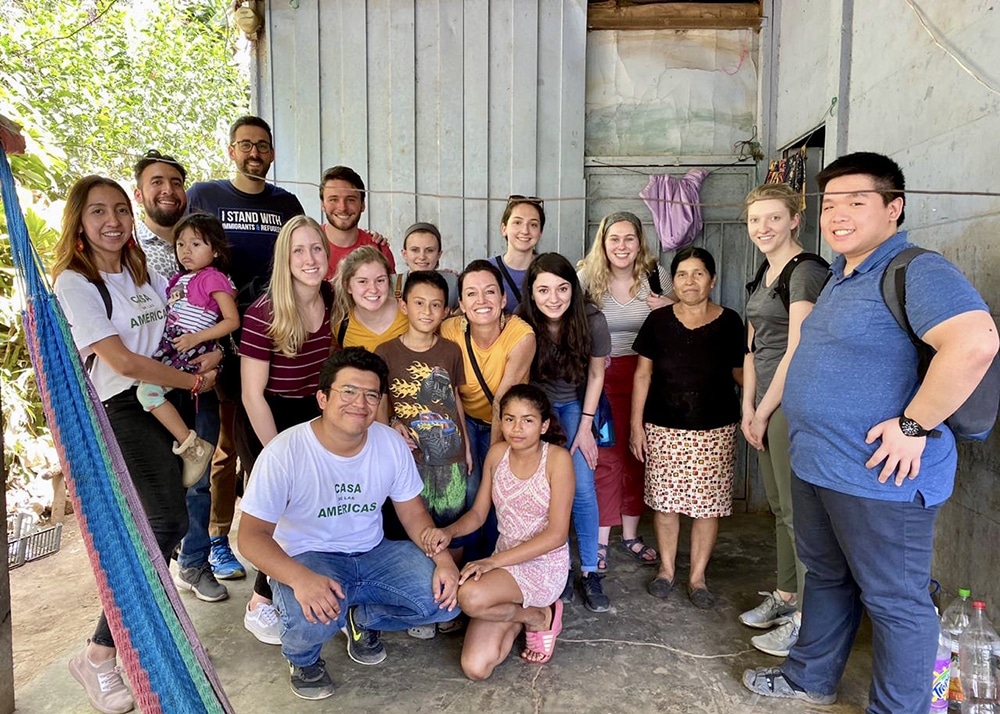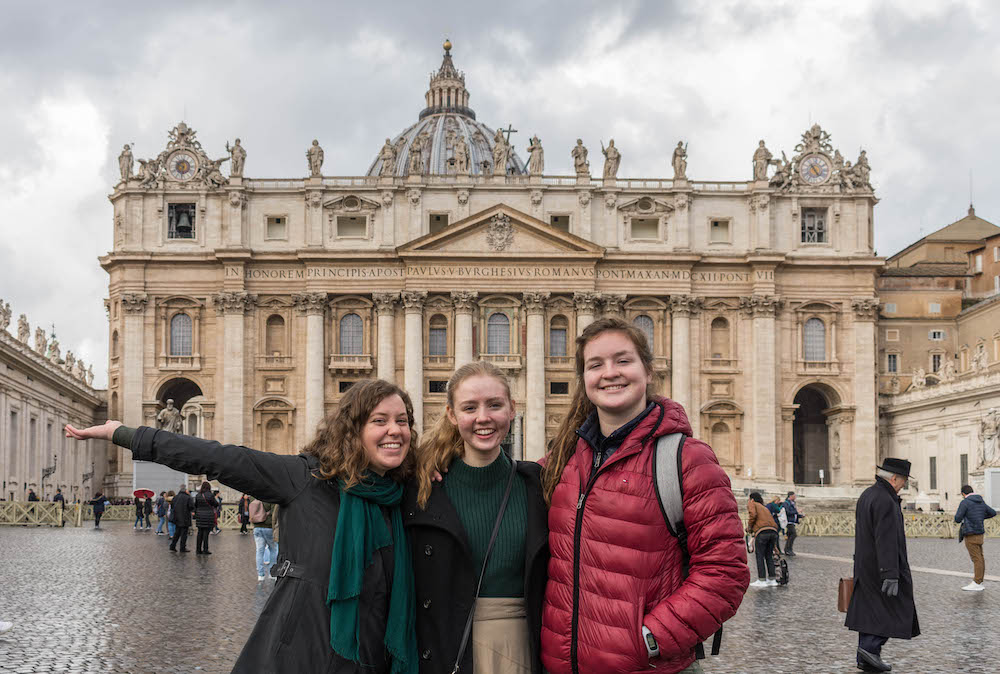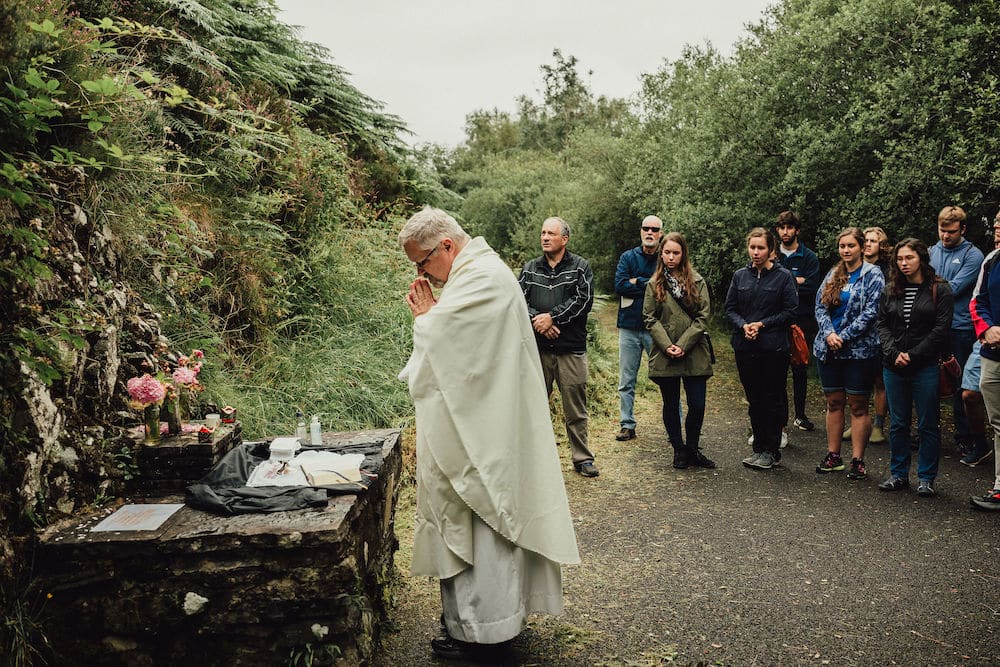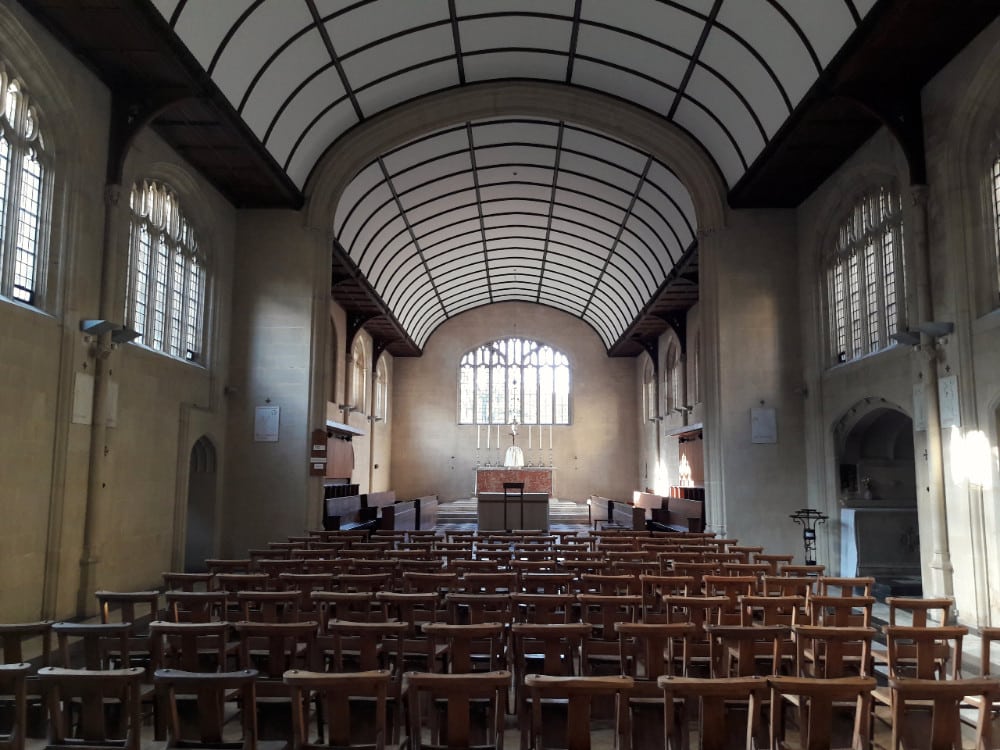One of the goals of a college education is to broaden one’s horizons and understanding, and to be more aware of the global society we live in today. For many students, one way this is accomplished is through study-abroad programs.
Marcus Mescher is associate professor of Christian ethics in the Department of Theology at Xavier University in Cincinnati. He took students on faculty-led programs to El Salvador in May 2015 and March 2020, and he will be returning with a new group this March.
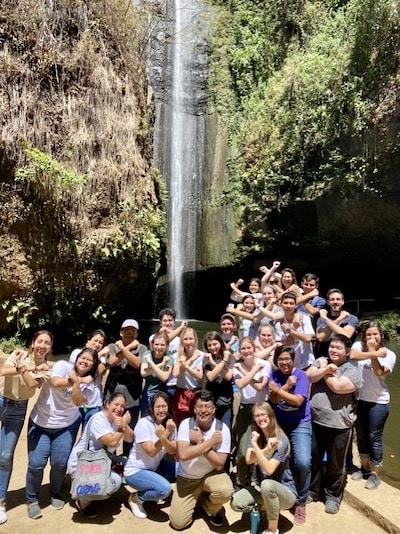
The program in El Salvador is framed by a semester-long course focusing on the connection between Christian faith and solidarity. Students prepare for the program by reading the letters and homilies of St. Oscar Romero, the Salvadoran bishop who was martyred in 1980. Students learn about the history of the Church in that country, including others who were martyred for their faith; once there, they visit the sites where these events happened.
Students are hosted by the Jesuit University of El Salvador (the UCA) through the Centro Ignacio Ellacuría, named for the Jesuit university president murdered for his vociferous critique of a military regime that killed 75,000 civilians in the 1980s. Here they learn about “a faith that does justice” by accompanying Salvadorans in rural parts of the country, Mescher said. This accompaniment is not just theoretical, but takes shape in the real world.
“Here they get to witness how community is formed, what it takes to empower leadership at the local level, and how they can use their studies at the UCA to help solve problems Salvadorans face, whether it’s access to clean water or building a computer lab and helping to teach digital literacy skills,” Mescher told Our Sunday Visitor.
Grappling with theology
After their time in El Salvador, the second half of the semester is spent processing what they experienced and strategizing how these lessons can be translated to the context of the United States.
“The trip is focused on the possibilities and limits of solidarity with the people of El Salvador, but also drawing on our time there to inform our efforts to overcome social distrust and division here in the U.S.,” Mescher said.
Read more Spring College articles here.
The turbulent history of the Church in El Salvador gives students the opportunity “to confront the ways that the Gospel gets domesticated in our time and place,” Mescher said. “It is powerful to stand in the UCA rose garden where the Jesuits were dragged in the middle of the night and killed (after enduring campus bombings and death threats on the radio and newspaper for years), to visit Romero’s home and pray at the chapel where he was assassinated.” The trip feels like a pilgrimage to especially holy places, he said.
The study-abroad program also makes it possible for the students to collaborate with students at the UCA and local church leaders, many of whom were inspired by the sacrifices of these martyrs. In the face of gang violence, extortion, government corruption, high rates of unemployment, domestic violence and more societal ills, these local ecclesial communities offer support and encouragement, and the students from Xavier University are proud to collaborate in these efforts.
“It is a less parish-centered and more of a people-centered vision of learning from and aspiring to emulate Jesus’ teaching and healing ministry,” Mescher said.
Mescher and his students were in El Salvador in March 2020, so the trip was cut short due to lockdowns and travel restrictions due to the COVID-19 pandemic. Until this semester, it hasn’t been possible to offer the course again. However, going forward, the program will continue in full force, and the collaboration of Xavier and the UCA goes on.
The topic of solidarity was particularly attractive to Samantha Mossing, who graduated from Xavier in 2022, and went to El Salvador with Dr. Mescher in 2020. Not only does the country have a history that has been greatly impacted by United States involvement, but she felt she should challenge the notions of El Salvador as “dangerous,” “poor,” and generally “troubled.”
“I was seeking an immersive experience that would broaden my perspective on the various issues that theology should grapple with,” Mossing said.
Mossing saw this trip as “more like a pilgrimage, an encounter, a spiritual experience, and an opportunity to build relationships that I never could have had otherwise.” The history of the Church in El Salvador, particularly the activity of the Jesuits as well as St. Oscar Romero, also drew her attention and helped draw her into the program.
Studying across the border
The University of St. Thomas in Houston has also resumed its study-abroad programs around the world, while continuing to monitor risk factors in destination countries and any new travel restrictions that may be imposed.
“One of four key pillars to ‘Greater Things’ (our strategic vision for 2030) is to accelerate our standing as a global innovator in Catholic higher education,” said Hans Stockton, associate vice president for international relations and engagement at the University of St. Thomas. “This includes expanding curricular, student, and faculty virtual and in-person exchange and collaboration with our old and new partners throughout the world.”
These opportunities abound at the University of St. Thomas. In recent years, students have studied abroad in countries including Argentina, Australia, Chile, the Czech Republic, Ireland, Japan, Taiwan, Mexico, Costa Rica and more.
Stockton recently returned from a visit to the Pontifical University of Mexico and John Paul II Junior College in Belize. The university has been engaging sister Catholic universities throughout the world and particularly in the Americas, Stockton said.
As the University of St. Thomas is a Catholic institution, the study-abroad programs do have a particularly Catholic bent to them, although each is different. “Each trip has its particularities in terms of faculty expertise, subject and location,” Stockton said, “but our faculty-led studies abroad have in common intentional learning, action and contemplation instructed by the intellectual tradition and teachings of the Church.”
Over spring break, the International Studies Program will lead students to Argentina as part of a class on food security and economic development. Additionally, students from UST’s pioneering Pragmatic Studies Program will travel to Belize this summer and conduct service projects with the San Pedro Roman Catholic Church and St. Theresa’s Casita Parish Ministry there.
The COVID-19 pandemic and resulting lockdowns meant that the study-abroad programs were shuttered for a time, but they are back in full swing now.
“While ever vigilant about the health and safety of our students, we are back to full speed with our study-abroad programs and activities,” Stockton said.
Paul Senz writes from Oregon.

